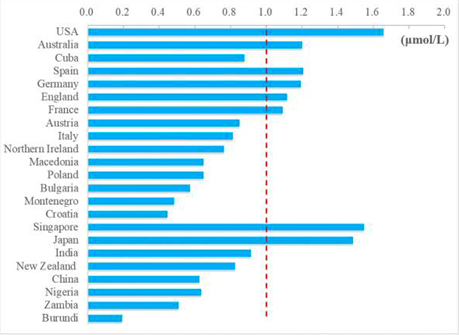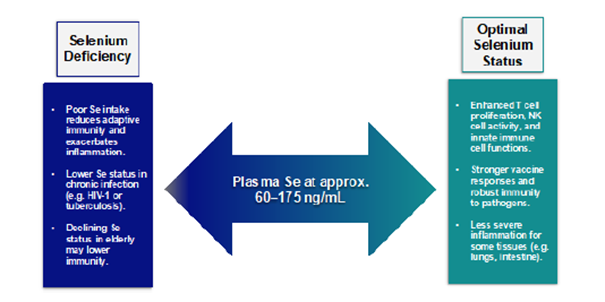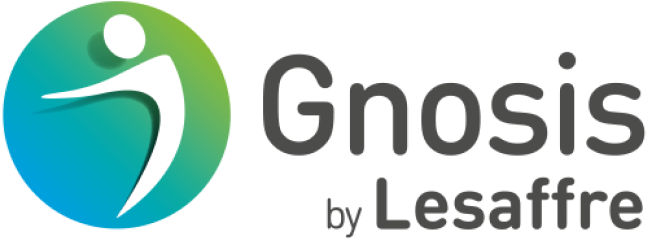
Selenium is an essential micronutrient for the human physiology and the immune system1. Selenium’s role in regulating the immune system has been well known to the scientific community for years.
With the onset of the pandemic, immunity has become the most important health issue for consumers around the world.
This unprecedented situation, which has engulfed over 200 countries represents a rare opportunity for studying and better understanding the relationship of selenium with the immune response.
Selenium in nature
Natural selenium present in one’s soil can vary drastically from country to country (Figure 1)2. Therefore, selenium deficiencies can be frequently observed in many areas of the globe. This in turn can influence the immune system in adults, affect the development of the immune system in children and lead to immune deficiencies in adolescents.
Figure 1. Selenium concentrations in serum plasma of healthy adults worldwide

Most of our selenium intake comes from food (soil, water, and livestock)3
Research shows that selenium deficiency is rare in the USA and Canada but is much more common in many regions of China, New Zealand, Europe, and Russia where selenium levels are low in the soil and food4.
As a reminder
Recommended reference value for adults:
USA 55 μg/day5
UK 60 μg /day6 (woman) 74 μg/day (man) 6
EUROPE 55 μg /day7
CHINA 60 μg /day8
- Selenium is a micronutrient linked to a wide variety of physiological processes, such as the central nervous system, the endocrine system, muscle function, male reproductive biology, the cardiovascular system and the immune system.
- Dietary selenium is obtained through foods, such as grains, vegetables, seafood, meat, dairy products and nuts9.
- Selenium is vital for many functions of immune cells.
Selenium and immunity
Adequate dietary intake of selenium can play an important role in the development and maintenance of the immune system. The predominant form of selenium absorbed by humans is an organic selenium linked to an amino acid which forms a selenoprotein. The selenomethionine1, which represents a much better bioavailability compared to inorganic forms, like selenate, selenide, or selenite10.
Many studies have shown that selenium and selenoproteins, in particular, play an important role in regulating the function of immune cells and that the disruption of these processes may lead to inflammation or immune-related diseases.
Research suggests that adaptative immunity (activation and functioning of lymphocytes T and B) and innate immune cell functions (macrophages activation, NK cell function) are distinctly influenced by selenium intake 11. Studies11 show that innate and adaptative immune responses against bacterial and parasitic infections rely on having enough selenium in the system for eliminating these pathogens. Studies even suggest that the antioxidant properties of some selenoproteins could contribute to enhance anti-viral immunity12. Some selenoproteins could even contribute to one’s protection against viruses13 and to the biological effects of some viruses2.
Figure 2: A summary of selenium and immune responses11

Selenium and infectious diseases
It has become increasingly clear in today’s world that nutrition is an essential factor that can influence one’s protection from various diseases. Essential trace elements like zinc, selenium, and iron can be vital to help regulate the immune system.14 Selenium is an essential trace element of high importance for human health and particularly for a well-balanced immune response.
Dietary selenium deficiency can affect host immunity and alter virus virulence 15
Viral infections, for example, increase the level of ROS (Reactive Oxygen Species) which can lead to the generation of oxidative stress and increase the demand for nutrients or cause their loss, which can lead to a deficiency in selenium16. Selenium, which plays an important antioxidant role in terms of natural defences, is one of those nutrients concerned.
It would therefore be interesting to take the environmental conditions into account, such as bioindicators of potential infections and subsequent pathogenesis. In naturally poor in selenium areas, it might be relevant to consider early supplementation of selenium to improve immune systems and better manage infectious diseases15, 17.
Sources
Avery JC, Hoffman PR. Selenium, Selenoproteins, and Immunity. Nutrients 2018;doi10.3390/nu10091203
Qiyuan Liu, et al. Selenium plays a key role in the biological effects of some viruses: implications for Covid-19. Enviro Res 2021; doi: 1016/j.envres.2021.110984 (https://www.ncbi.nlm.nih.gov/pmc/articles/PMC7937041/)
National Academy of Sciences. Institute of Medicine. Food and Nutrition Board. 2004.
https://efsa.onlinelibrary.wiley.com/doi/epdf/10.2903/j.efsa.2014.3846
Finley, J.W. Bioavailability of selenium from foods. Nutr. Rev. 2006, 64, 146-151.
Mahima et al.Pak J Biol Sci 2012;doi:10.3923/pjbs.2012.418.425
DISCOVER ALL OUR LATEST NEWS

Webinar Rethinking Women’s Health 24 June 2025
Women’s health is complex, constantly evolving, and a broader perspective is long overdue, one that goes beyond reproductive care to include mental health, chronic conditions, and the unique ways diseases manifest in women.

Gnosis by Lesaffre Highlights Quatrefolic® at New Nutrition Forum in Hangzhou, China
Gnosis by Lesaffre was proud to serve as the Title Sponsor of the New Nutrition Forum held in Hangzhou on June 6, 2025. As part of the event’s scientific agenda, we hosted an engaging seminar focused on Quatrefolic®, the 4th generation active folate.

Biotic Live: A Successful First Edition Exploring the Power of Probiotic Yeasts
Gnosis by Lesaffre recently hosted the first edition of Biotic Live, a unique event dedicated to exploring the potential of probiotic yeasts. This live session brought together leading experts to present the latest scientific insights and real-world applications of live yeasts in human health.


